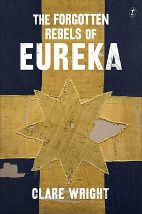The forgotten rebels of Eureka by Clare Wright

Text Publishing, 2013. ISBN 9781922147370.
(Age 16+) Recommended. Many readers of Australian history know that
women sewed the Eureka flag. Less well known is that they were at
the forefront of the 1854 rebellion as activists and participants.
Clare Wright may have rewritten the history of a significant turning
point in Australia's political and social history.
The forgotten rebels of Eureka, is both an academic argument
and a narrative history. The author's thesis is that women played a
crucial role in transforming discontent over mining licences and
access to land into a call for justice and the extension of
democratic rights. The early chapters depict the journey to Ballarat
from overseas and across colonial borders, the creation of homes in
a tent city and the search for sources of income. Many of the women,
including those who became influential leaders, are identified by
name. Their experiences as wives, mothers, miners, shopkeepers,
journalists, hoteliers, actors and prostitutes help to explain the
dynamics of a community in crisis. Once readers are familiar with
the fabric of Ballarat society, Clare Wright launches into a
narrative of the rebellion and its aftermath, demonstrating that
women were both present at the stockade and among its casualties.
The writing style emphasizes rather than understates the drama.
Excerpts from newspaper articles and memoirs provide contemporary
voices. An epilogue charts the post-Eureka lives of some of the
principal participants and the large font eases the demands of
digesting a wealth of information. Source notes and a bibliography
will satisfy scholars. Explanations of some aspects of life on the
goldfields may be confronting for young adults.
By including women in the story of Eureka, Clare Wright has
redressed a longstanding gender imbalance in the telling of an
iconic story, to reveal a community of people who challenged the
existing order. In doing so, she has also illuminated many of the
rebellion's larger themes including multiculturalism, the role of
the press, the administration of justice, the use of armed force and
the campaign for universal suffrage.
Elizabeth Bor